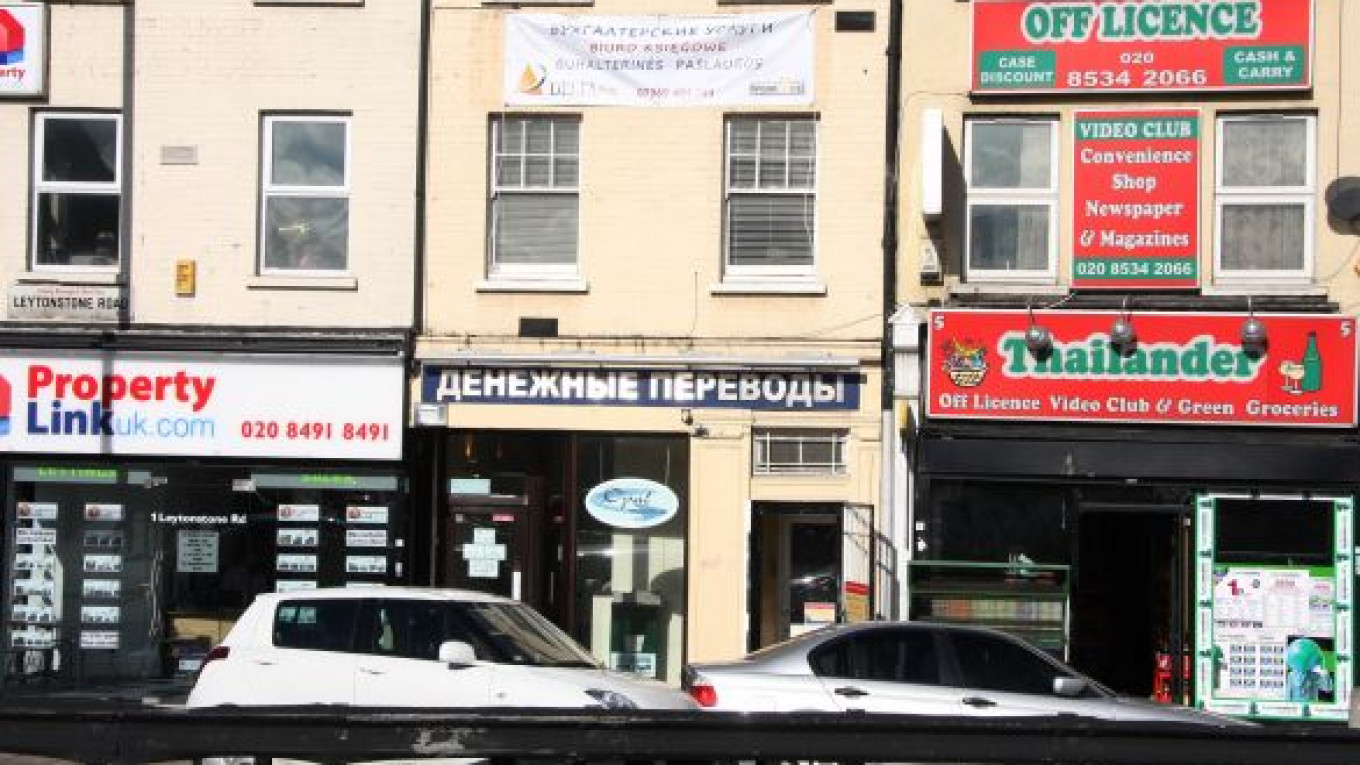LONDON — From a tiny shop in East London's Stratford Shopping Centre, Vadim, a thick-set man who prefers not to give his last name, imports gold from Russia and Ukraine and sells rings, necklaces, earrings and other trinkets to his compatriots across the British Isles.
Complete with Cyrillic signs and the ubiquitous sound of spoken Russian, Stratford is home to the highest concentration of Russians in London. The few wealthy Russians who settle in Britain would be "lost in the crowd" of these numerous economic migrants, Vadim said.
Standing amid his jewellery, rows of garishly painted samovars and a few mannequins in wedding dresses, Vadim told The Moscow Times with a flicker of pride that "almost all of England comes to me." His clientele are not located just in London, but in cities as far afield as Manchester, Liverpool and Edinburgh.
Vadim left Russia 11 years ago and has lived in Stratford ever since. Over that period he has watched the population of Russian-speakers in the area increase dramatically. Now it is "mainly people from the Baltic states" he said, because they have no need for British visas after their countries acceded to the European Union. Across the aisle from Vadim's Russian GOLD business is a Lithuanian food store.
But Russians in Stratford do not only rub shoulders with migrants from Eastern Europe; there are large Afro-Caribbean, Indian and Pakistani communities. In the newsagent windows accommodation advertisements in Russian and Polish hang alongside those in Hindi and Urdu.
The population of Russians is a transient one. "People come and then they leave," with the majority finding manual labor jobs, Vadim said. They work long hours and weekends. Frequently they have not entered Britain legitimately. "It's no secret that there are a lot of illegals," he added.
The exact quantity of ethnic Russians living in Britain is impossible to ascertain. Britain's Office for National Statistics estimates the number of Russian-born individuals in Britain to be about 35,000. Among former Soviet Union states this is the second-largest figure after Lithuania, at 74,000.
Ilya Gonciarov, editor of the Russian-language weekly Angliya, which has a print run of 30,000, estimates the Russian-speaking population of the United Kingdom at 600,000. There are at least five different Russian-language newspapers published regularly in London.
Unlike the highly publicized, glamorous lifestyles of oligarchs in London, less well-heeled migrants typically work in the building or hospitality industries. Many others take jobs as nannies, au pairs or live-in helpers.
Olga, a solid, resourceful, middle-aged woman arrived in Britain 10 years ago from the Urals, speaking no English.
She decided to leave Russia in 2000 after a friend told her about the Russian community in London.
"I don't know what I was thinking," Olga said. "I thought I could find a nanny job."
Among other jobs, she has worked as a laundry lady and the domestic help for the aged parents of a former Russia correspondent of a Britian-based international business newspaper. Now she works in a restaurant at a big hospital.
She studied law at a university in Russia before taking a job as an administrator at a rocket factory in the town where Pyotr Tchaikovsky was born, working for the department that managed American inspectors as part of the Intermediate Range Nuclear Forces disarmament treaty. She later moved to Moscow to work as a nanny for an American family.
At first, like Vadim, she lived in Stratford where, she said, "any white face was speaking Russian." But after that she moved out to Kingston upon Thames in London's leafy southwest suburbs.
Originally Olga arrived on a six-month work visa, which should be renewed every six months. "But who does this?" she asked with a half-disarming, half-knowing smile.
She said she prefers working for English families rather than for Russians living in Britain, who treated her like a servant. "I am not a servant inside," she said.
Many of those who have migrated from Eastern Europe and the former Soviet Union, like Olga, take manual work for which they are overqualified. She estimates, not entirely in jest, that 50 percent of London's hotel cleaners have a higher education.
One of the big advantages of life in Britain, Olga said, is the proximity of the sea. Whenever it is sunny, she enjoys going to one of the resorts on Britain's southern coast — Brighton, Bournemouth or Margate.
Unlike the numbers of wealthy Russians, however, the flow of economic migrants into London could be falling off.
"The quantity of Russians is not seriously growing," Vadim said. He cited the financial crisis and lower wages as the main reasons.
Though Olga visits her family in Russia occasionally and admits that she often considers returning permanently, she does not see herself leaving London in the near future. "Something has always pushed me to stay. I do not have any nostalgia for Russia," she said.
A Message from The Moscow Times:
Dear readers,
We are facing unprecedented challenges. Russia's Prosecutor General's Office has designated The Moscow Times as an "undesirable" organization, criminalizing our work and putting our staff at risk of prosecution. This follows our earlier unjust labeling as a "foreign agent."
These actions are direct attempts to silence independent journalism in Russia. The authorities claim our work "discredits the decisions of the Russian leadership." We see things differently: we strive to provide accurate, unbiased reporting on Russia.
We, the journalists of The Moscow Times, refuse to be silenced. But to continue our work, we need your help.
Your support, no matter how small, makes a world of difference. If you can, please support us monthly starting from just $2. It's quick to set up, and every contribution makes a significant impact.
By supporting The Moscow Times, you're defending open, independent journalism in the face of repression. Thank you for standing with us.
Remind me later.







